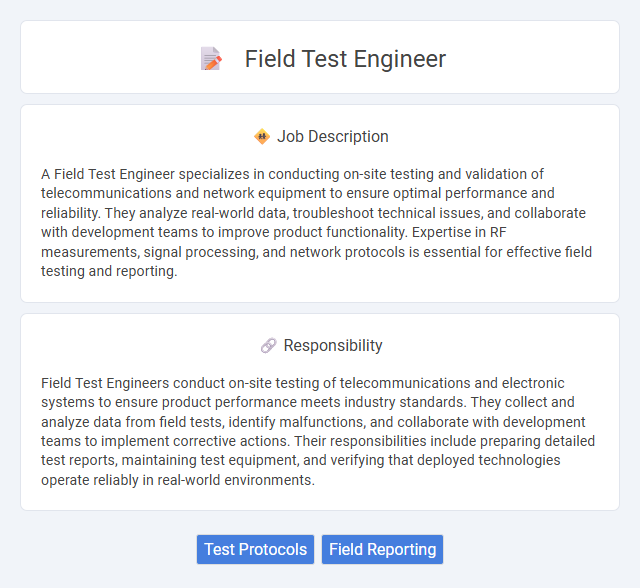
A Field Test Engineer specializes in conducting on-site testing and validation of telecommunications and network equipment to ensure optimal performance and reliability. They analyze real-world data, troubleshoot technical issues, and collaborate with development teams to improve product functionality. Expertise in RF measurements, signal processing, and network protocols is essential for effective field testing and reporting.
Individuals who thrive as Field Test Engineers are likely to possess strong problem-solving skills and adaptability, given the dynamic environments and technical challenges encountered in this role. Candidates with a detail-oriented mindset and effective communication abilities may be better suited to manage testing procedures and collaborate with cross-functional teams. Those who prefer structured, repetitive tasks might find this position less ideal, as it often requires troubleshooting in unpredictable situations and frequent travel.
Qualification
A Field Test Engineer typically requires a bachelor's degree in electrical engineering, computer engineering, or a related technical field combined with hands-on experience in testing and troubleshooting complex systems. Proficiency in signal processing, data analysis, and using advanced test equipment is essential for accurately diagnosing and optimizing product performance under real-world conditions. Strong problem-solving skills and familiarity with wireless communication protocols, network configurations, and industry standards enhance the engineer's ability to ensure quality and compliance during product development cycles.
Responsibility
Field Test Engineers conduct on-site testing of telecommunications and electronic systems to ensure product performance meets industry standards. They collect and analyze data from field tests, identify malfunctions, and collaborate with development teams to implement corrective actions. Their responsibilities include preparing detailed test reports, maintaining test equipment, and verifying that deployed technologies operate reliably in real-world environments.
Benefit
Field Test Engineer positions likely offer significant benefits including hands-on experience with cutting-edge technology and opportunities for direct problem-solving in diverse environments. Employees in this role may enjoy enhanced career development prospects due to exposure to multiple industries and real-world applications of technical skills. Compensation packages often include travel allowances and performance-based bonuses, potentially increasing overall job satisfaction.
Challenge
Field Test Engineer roles likely present challenges involving troubleshooting complex systems in unpredictable environments. Managing real-time data analysis under pressure may require quick decision-making and adaptability. There is a probable need to balance technical expertise with effective communication to resolve issues efficiently on-site.
Career Advancement
Field Test Engineers enhance product quality by conducting rigorous on-site testing and troubleshooting complex systems. Mastery in data analysis, communication, and problem-solving fosters rapid career advancement toward roles such as Test Manager, Systems Engineer, or Product Development Lead. Continuous skill development in emerging technologies and cross-functional collaboration significantly accelerates professional growth in this dynamic field.
Key Terms
Test Protocols
Field Test Engineers develop and implement detailed test protocols to evaluate system performance under real-world conditions. These protocols include precise step-by-step procedures, data collection methods, and performance criteria to ensure consistent and repeatable testing outcomes. Mastery of test protocol design directly impacts the accuracy of diagnostics and overall product validation in diverse field environments.
Field Reporting
Field Test Engineers specialize in collecting and analyzing real-time performance data during on-site equipment evaluations to ensure compliance with technical specifications. They generate detailed field reports documenting test procedures, observed issues, and resolution outcomes, which are critical for continuous product improvement and client communication. Accurate field reporting enhances troubleshooting efficiency and supports informed decision-making throughout the product development lifecycle.
 kuljobs.com
kuljobs.com